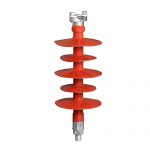Composite insulator’s shed and sheath are be made of high temperature vulcanizing (HTV) type silicone rubber, having silicone polymer content by weight 30% minimum. Alumina Trihydrate (ATH) is used as a filler. The filler is properly mixed with silicone compounds to ensure uniform distribution. The thickness of the sheath shall be a minimum of 3 mm and shall have excellent hydrophobic and anti-tracking properties.
The material shall conform to the tests specified in IEC or other technical standard equivalents. The material preferably shall be such that it should not attract birds or other rodents at storage location or on the line. In some countries, like India, the thickness of the shed at the edge should not be less than 2.5mm to minimize the external damage. The strength of shed to sheath interface shall be greater than the tearing strength of the polymer. And cleaning methods of silicon rubber sheds shall be paid attention to.

To test the material property of composite insulator, professional testing machines and devices are needed to ensure accuracy. These are testers often used for insulator tests and test of its materials:
>>Recommended composite insulators mechanical test equipment
>>Recommended composite insulators electrical test equipment
